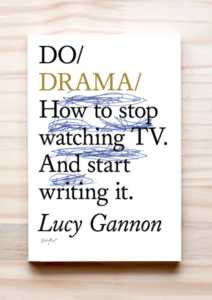How to stop watching tv and start writing it. We share our book review of Lucy Gannon’s ‘Do Drama’. In this fantastically honest and accessible book screenwriter Lucy Gannon, who wrote her first script at the age of 39, takes you through the writing process, not as an instruction manual but as a conversation.
Lucy opens with;
“What makes you a writer? And in a world of non-writers, why you?
Well, why not you?”
We couldn’t agree more!
Lucy takes you through the writing process, from idea to polished script and beyond, with a brilliant combination of advice, practical steps and exercises, and an honest description of how it feels; all the joys and anxieties and worries that all writers experience.
Part 1: Questions, questions…
‘Do Drama’ walks you through the various stages of developing an idea before you start writing the script and the questions you need to discover answers to.
This pre-script development phase is crucial and many novice writers skip over it, preferring to dive into the script first. But like almost all professional screenwriters, Lucy’s process starts long before she starts writing script pages.
She makes this part of the writing process feel both do-able and fun as she asks the questions:
- Why drama?
- What sort of drama?
- Who are you writing for?
- What should you write about?
- What’s the storyline?
- Who are the characters?
Lucy offers great tips and advice for finding your own answers and creating a process that works for you.
Part 2: From words to action
In this second part, Lucy guides you through the next phase of the screenwriting process and beyond.
- Bare bones
- Start writing
- Rewrite
- Brown envelope time
- Then comes the day
- On set
- The players
We particularly loved Lucy’s honest description of dealing with procrastination as she shares the process she’s developed for coping with the days when nothing comes.
Lucy recognises the importance of distraction to let ideas percolate and solutions arise subconsciously but adds:
“There’s a balance to be found between being workmanlike and being writerly and being just plain idle. If we distract ourselves all day that’s not good. If we distract ourselves every day, we aren’t writing. And if we aren’t writing, we have stopped being writers and we need to get a proper job.”
Lucy describes that nerve-wracking process of sending your precious work out into the world.
Those next steps into the industry are constantly evolving so it might be worth taking a look at our advice on how to get an agent and how to get read by producers.
There’s also a helpful overview of the different roles played by agents, producers and directors, though we’ll have to agree to disagree with Lucy on her description of script editing as a ‘non-creative role’!
Overall this is a fantastic insight into the professional screenwriting process with great advice. A screenwriting book that is honest, practical and inspiring.
Get your copy direct from the Do Book Company or from your preferred book retailer by searching ‘Do Drama’.




